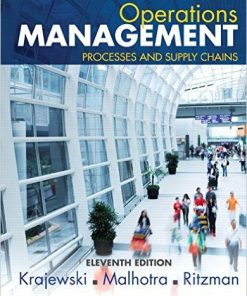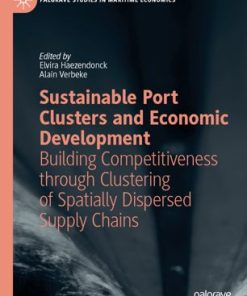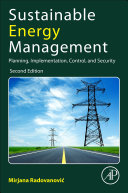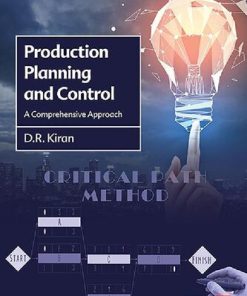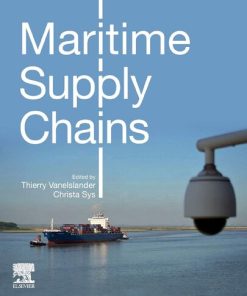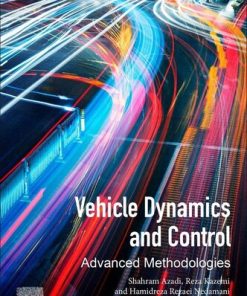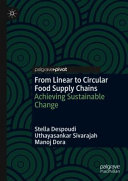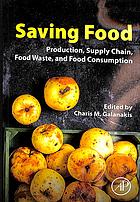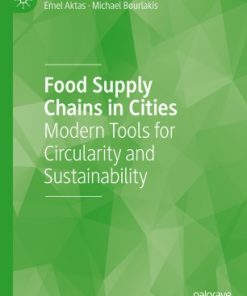Sustainable food supply chains planning design and control through interdisciplinary methodologies 1st edition by Riccardo Accorsi, Riccardo Manzini 0128134127 9780128134122
$50.00 Original price was: $50.00.$25.00Current price is: $25.00.
Sustainable food supply chains : planning, design, and control through interdisciplinary methodologies 1st edition by Riccardo Accorsi, Riccardo Manzini – Ebook PDF Instant Download/DeliveryISBN: 0128134127, 9780128134122
Full download Sustainable food supply chains : planning, design, and control through interdisciplinary methodologies 1st edition after payment.
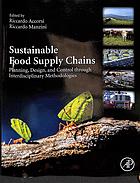
Product details:
ISBN-10 : 0128134127
ISBN-13 : 9780128134122
Author : Riccardo Accorsi, Riccardo Manzini
Sustainable Food Supply Chains: Planning, Design, and Control through Interdisciplinary Methodologies provides integrated and practicable solutions that aid planners and entrepreneurs in the design and optimization of food production-distribution systems and operations and drives change toward sustainable food ecosystems.
With synthesized coverage of the academic literature, this book integrates the quantitative models and tools that address each step of food supply chain operations to provide readers with easy access to support-decision quantitative and practicable methods.
Broken into three parts, the book begins with an introduction and problem statement. The second part presents quantitative models and tools as an integrated framework for the food supply chain system and operations design. The book concludes with the presentation of case studies and applications focused on specific food chains.
Sustainable food supply chains : planning, design, and control through interdisciplinary methodologies 1st Table of contents:
Chapter 1: Modeling inclusive food supply chains toward sustainable ecosystem planning
Abstract
1 Introduction
2 A framework to model food supply chains
3 Discussion and applications
4 Conclusions and further development
Chapter 2: Emerging issues and challenges in agri-food supply chain
Abstract
Acknowledgment
1 Introduction
2 Issues, advantages, and challenges
3 Conclusions and future outlook
Chapter 3: The role of modeling and systems thinking in contemporary agriculture
Abstract
1 Background
2 The power of agricultural systems thinking
Chapter 4: Food shelf-life models
Abstract
1 Food shelf-life meanings
2 Food shelf-life study motivations
3 Food shelf-life modeling
4 Food shelf life and sustainability
Chapter 5: A support-design procedure for sustainable food product-packaging systems
Abstract
1 Background
2 Hierarchical support-design procedure
3 Conclusion
Chapter 6: Designing advanced food packaging systems and technologies through modeling and virtualization
Abstract
1 Introduction
2 Packaging research, preliminary design and production
3 Applications of theoretical and experimental modeling techniques
Chapter 7: Sustainable food processing: A production planning and scheduling perspective
Abstract
1 Introduction
2 Production planning and scheduling
3 Cyclic scheduling
4 Conclusion and discussion
Chapter 8: Design-support methodologies for job-shop production system in the food industry
Abstract
1 Introduction
2 Background
3 Methodology
4 An industrial catering application
5 Discussion and lessons learned
6 Summary and conclusions
Chapter 9: The storage of perishable products: A decision-support tool to manage temperature-sensitive products warehouses
Abstract
1 Introduction
2 Warehouse temperature distribution
3 Warehouse temperature mapping
4 Methodology
5 A diagnostic-support tool
6 Tool validation with industrial case studies
7 Modeling storage assignment for temperature-sensitive products
8 Conclusion and future outlooks
Chapter 10: Mathematical modeling of food and agriculture distribution
Abstract
1 Introduction
2 Routing problems
3 Network design and distribution problems
4 Similar research problems
5 Conclusions
Chapter 11: Using vehicle routing models to improve sustainability of temperature-controlled food chains
Abstract
1 Introduction: Sustainability in temperature-controlled chains
2 Vehicle routing problem for temperature-controlled food transportation
3 Multicriteria problems for cold chains
4 Using a VRP to quantify sustainability effects of collaboration: An illustrative example
5 Concluding remarks
Chapter 12: Cool chain and temperature-controlled transport: An overview of concepts, challenges, and technologies
Abstract
1 Introduction
2 Cool chain management
3 Technologies to maintain quality in perishable transport
4 Achieving sustainability in cool chains
5 Concluding remarks
Chapter 13: Food transportation and refrigeration technologies—Design and optimization
Abstract
1 Introduction
2 Food transportation methods
3 Food transportation technologies
4 Food transportation requirements
5 Traceability and temperature monitoring
6 Conclusions and future trends
Chapter 14: Quality assessment of temperature-sensitive high-value food products: An application to Italian fine chocolate distribution
Abstract
Acknowledgments
1 Introduction and literature review
2 Closed-loop control system and thermostatic chamber
3 Case study: Products, monitoring step and shipments selection
4 Sensory analysis
5 Results from simulation and comparative analyses
6 Conclusions and further research
Chapter 15: Models and technologies for the enhancement of transparency and visibility in food supply chains
Abstract
1 Introduction
2 Resource efficiency and food waste challenges in supply chains
3 Transparency and visibility in food supply chains
4 Overview of concepts and models for increased visibility and transparency
5 Overview of technologies
6 Industrial field studies—Putting concept and models into reality
7 Value and challenges with sharing information and providing increased transparency in food supply chains
Chapter 16: Forecasting for food demand
Abstract
1 Introduction
2 Univariate forecasting
3 Including exogenous variables
4 Selecting between methods
5 Refocusing the scope: Cross-sectional aggregation
6 Extracting information from the data: Multiple temporal aggregation
7 Concluding remarks and the role of judgment
Chapter 17: Food systems sustainability: The complex challenge of food loss and waste
Abstract
1 Sustainability in food systems: A resource nexus challenge
2 Defining and measuring food loss and waste
3 Understanding the causes
4 Analyzing the impacts: A life cycle thinking perspective
5 Designing policies to address FLW
6 The way ahead
Chapter 18: Handling food waste and losses: Criticalities and methodologies
Abstract
1 Introduction
2 The challenges
3 The Food Loss Bank and Digital Agriculture
4 Case study: A vegetables supply chain
5 Concluding remarks
Acknowledgments
Acronyms
Appendix A Mathematical model
Appendix B Weighted Average Source Distance
Chapter 19: Sustainable urban food planning: Optimizing land-use allocation and transportation in urban-rural ecosystems
Abstract
1 Introduction
2 Short literature review
3 Modeling low-carbon urban ecosystems
4 Methodology and planning-support tools
5 Numerical example
6 Conclusion
Chapter 20: Sustainable operations in reusable food packaging networks
Abstract
Acknowledgment
1 Introduction
2 Literature review
3 Methodology
4 Case study
5 Discussion
6 Experience from other reusable packaging networks
7 Conclusions
Chapter 21: A model to enhance the penetration of the renewables to power multistage food supply chains
Abstract
1 Introduction and background
2 Problem formulation and entities
3 Model presentation
4 Discussion
5 Conclusion and next steps
Chapter 22: Decision support models for fresh fruits and vegetables supply chain management
Abstract
1 Introduction
2 General planning models for fruits and vegetables
3 Tactical decision making under uncertainty
4 Conclusions and future research
Chapter 23: Modeling by-products and waste management in the meat industry
Abstract
Acknowledgments
1 Introduction and background
2 Problem framework
3 Model
4 An application from the meat industry
5 Data collection
6 Results
7 Conclusions
Chapter 24: Recipe-driven methods for the design and management of food catering production systems
Abstract
Acknowledgments
1 Introduction
2 Methodology
3 Proof of concept
4 Discussion
5 Conclusions
People also search for Sustainable food supply chains : planning, design, and control through interdisciplinary methodologies 1st:
short food supply chains sfsc as local and sustainable systems
enablers to implement sustainable initiatives in agri food supply chains
sustainable food systems in fruits and vegetables food supply chains
short food supply chains as drivers of sustainable development
sustainable agri food supply chain management
Tags: Sustainable food, supply chains, planning, design, control through, interdisciplinary, methodologies, Riccardo Accorsi, Riccardo Manzini
You may also like…
Business & Economics - Mathematical Economics
Engineering
Sustainable Energy Management: Planning, Implementation, Control, and Security 2nd edition
Business & Economics
Earth Sciences
Engineering - Automotive
Vehicle Dynamics and Control: Advanced Methodologies Shahram Azadi
Politics & Philosophy - Government & Politics
Saving Food : Production, Supply Chain, Food Waste, and Food Consumption Galanakis
Politics & Philosophy
Food Supply Chains in Cities: Modern Tools for Circularity and Sustainability 1st Edition




